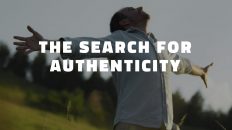Few institutions would dare to encourage self-trust. Instead, most authorities teach us to become placid participants in various systems. They do not teach us to be happy. If anything, they underline the dangers of freedom and the importance of control.
Because these notions are so common—in our schools and churches, at the dinner table, and on the evening news—we begin to learn what we think is a universal truth: we must hold ourselves together. We learn that if we let ourselves go, we will become evil, lazy, savage. We learn the importance of pressure and restraint. We learn to repress our genuine desires because they’re incompatible with society’s expectations. We learn that if we are not doing well in a school subject or a self-improvement plan, then we are not pushing ourselves hard enough. We learn that people who succeed are examples of this kind of pushing. We learn that those who stop doing something only because it feels wrong are lazy.
Even people who oppose one institution’s dogma often end up buying into another’s. It is difficult to escape these teachings because they are so ubiquitous.
Humans are pattern-seeking, storytelling animals. From the world around you, you have learned which patterns to seek and which stories to tell. Your unconscious inner conversation has helped you mimic the people around you rather than understand yourself better. When you learn, from a young age, to fear, ignore, and suppress parts of your experience, you can only tell half the story. You remain an acquaintance to your reflection instead of an intimate friend.
To live how you feel is right takes the same effort as to live how you’re told is right. The work is the same. What is different is the reward. No amount of approval and no size of achievement can ever fill the space reserved for your opinion of yourself.
Of course, in the real world, we need both. We cannot live only by our own expectations. I wouldn’t suggest driving on the opposite side of the road simply because you “feel that it’s right.” Self-trust is not about rebellion, and it’s not about hedonism. It’s about realizing that all your experiences—your thoughts, your emotions, your dreams—are valid. They exist for a reason.
Accepting this reality does not require you to believe each thought, act on each emotion, or fulfill each dream. Quite the contrary, embracing each part of your experience gives you the ability to understand it, explore it, and integrate it.
Instead of labeling your emotions as problems to solve, you can see them as signals to interpret. Instead of judging your desires as shameful aberrations, you can learn to meet them in healthier ways. Instead of calling yourself critical names when you cannot build or break certain habits, you can explore your motivations.
You can become a student of yourself rather than always seeking a wiser teacher.

















